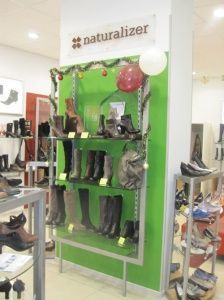
Best seller: Ludmila Savenkova, Monarch

Everyone dreams of becoming successful. And only a few become them. Why? What sets these lucky few apart? Emotionality and energy. Practicality and iron logic. Flexibility and ability to solve specific issues. Sentimentality is alien to true leaders, they are not afraid of criticism. As a rule, they are indifferent to difficulties and have tremendous self-control. All these qualities are combined by Lyudmila Savenkova, director of the MONARCH shoe store in the Otradnoye district of Moscow. The image of Bagheera in a Skirt is complemented by a subtle sense of humor, a sincere smile, an open gaze, a classic black outfit and tastefully selected jewelry.
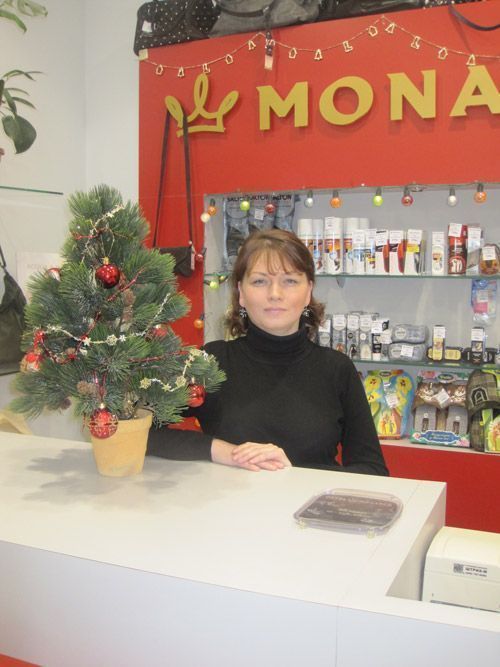 Leader! Get out of the dusk!
Leader! Get out of the dusk!
In the original, the image of Bagira is completely unambiguous - a warrior heroine with a halo of romance. Lyudmila is very reminiscent of this graceful character. The initiative of reconciliation of the warring parties (in our case, the seller with the buyer), and the relationship of real friendship (with the team), and the relationship of motherhood (with the family) organically fit into the model of her behavior.
Seeing me - a frozen and unhappy victim of capital traffic jams, Lyudmila immediately gave coffee to her. Then she introduced me to the sellers, walked through the sales area, showed the collection, and when we returned to her workplace, I moved on to tell about myself. It happens that it is difficult to conduct a conversation with a stranger, but Lyudmila immediately disposes to communication, answers honestly and benevolently, and her eyes glow with pride, because in such a short time she has achieved a lot. The result is a beautiful story of the transformation of an ordinary housewife into a successful lady.
- How did you come to trade?
- I graduated with honors from the technical school of light industry and for two years I studied at the institute with a degree in “Technologist-designer of women's clothing”. But the military career of her husband, a border guard, required moving. Therefore, I was engaged in raising a child and at home. When we returned to Moscow, I realized that I could no longer be just a “homemaker” and decided to find a job. At that time, the MONARCH store was opening on Basmannaya Street (now it is Sretensky Boulevard). I was hired as a sales assistant. I will never forget the first day of work, it was very exciting, although the duties were the most common - to prepare the store for the opening, get acquainted with the assortment and other sellers. The lack of specialized education did not bother me, I learned everything in practice. Two months later, having passed all the assessment tests, I became an administrator, and six months later I was appointed director of a store in Otradnoye.
- Why did you decide to stay in the profession and in the company?
- I liked the company's policy, the motivation system, because material reward plays an important role. It's nice that I was appreciated and given the opportunity for career growth. Yes, and one more thing: I was very lucky with the teams. This is not surprising, because here I myself was engaged in the selection of the team, but with the girls from the previous place of work, we became good friends and still communicate.
- What new have you discovered in yourself while you work in the company?
- I realized that I can be a leader, I can lead, loyally set up and lead a team, convince, not force. My subordinates feel a fine line between carrot and stick in my behavior. And although the boss is forced to maintain a certain distance from his subordinates, I was able to create a friendly atmosphere in the team of my store - this can be seen even by the customers of our store.
- How do you solve work conflicts?
- I'm not afraid of conflicts, but I try to prevent them. Of course, it can be unpleasant when a customer, trying on shoes, deliberately throws them around the hall. Sometimes there are claims for consumer (in the process of using shoes) marriage. Once an overweight woman bought boots with a narrow bootleg from us. During the fitting, she could not even button them all the way. And then she brought it back with the zippers torn out. Another customer decided to return the winter boots with natural fur because they seemed too cold for the Moscow winter. There are difficult clients who require me to serve them. There are practically no problems with personnel. My team knows how to work in a team, everyone is focused on a common result, and not just everyone for himself.
- What achievements of your sales network are of the greatest importance to you?
- Recently, our company celebrated its 20th anniversary, this is a worthy period, by no means every company will live on the competitive Russian market for so long. I think that this is due to the correctly chosen ratio of price and quality, high level of service and competent brand positioning.
- What financial indicators are you planning for 2010? What do you expect from next year?
- At the moment we are already close to the planned goal. We have a plan for two seasons a year: autumn-winter and spring-summer. Each season, sales increase by at least 10%.
- Is your store somehow different from other stores in the chain?
- I, of course, will be subjective, but ours is the most comfortable! With the friendliest atmosphere! Buyers themselves say so!
- Do you and your loved ones wear MONARCH shoes? What are its advantages for you personally?
- We wear! - Lyudmila, her deputy and two saleswomen answer in chorus and readily demonstrate their shoes. MONARCH shoes, in their common opinion, are very comfortable and wear for a long time, be it stiletto heels or flat boots. They were convinced of this themselves and therefore, with a clear conscience and pride, recommend it to both customers and their loved ones.
- In the rating of criteria influencing the choice of footwear, consultations of sellers are in last place - 0,4%. Although 38% of women and 18% of men make a purchase decision while already in the store. What are the reasons for such a low importance of consultations? Whether it is our social attitude - not to reckon with the seller. Whether it is a lack of competence of the sellers themselves. Maybe there are other reasons?
- Not every store has a salesperson who knows how to find an approach to a client. Often there are "supervisors" who follow on the heels and defiantly put things in order after the client, placing the goods. Buyers perceive such a seller as a direct threat to their wallet. Questions "Can I help you?", "Suggest anything?", "What interests you?" they do not evoke a clear desire to continue the conversation. First you have to watch. Noticing that some product has attracted attention, you can say something like: “This is a model from a new collection. How do you like this style? "," Do you look after yourself? This is just your size ”,“ These boots, despite the high heel, have a very comfortable last. Would you like to try it on?" The buyer's fear of the seller is deep in our subconsciousness and is rooted in the distant past, because the word "seller" appeared in ancient Rome and came from the word "swindler". Therefore, the best way to deal with customers is to stop being a salesperson for them. You need to become a consultant, assistant, friend, anyone, but not a salesman.
- Do sellers need professional education or not?
- In principle, no. In educational institutions, more attention is paid to theory. But the most important thing in sales is practice! In our company, training of sales personnel does not imply external trainings and seminars, it is so complete. Each new seller receives methodological material, which describes the techniques and psychology of sales, personnel policy, which tells about the values of the company. This is the first step. Further, shop directors become mentors for newcomers, they teach them on the job. The next step is independent study of the product and professional development through internal trainings with the help of a training manager.
- On the question of values. Are they spelled out only in training manuals? It's just that not so long ago, at one of the seminars, we just talked about the fact that the seller must go through three stages of adaptation: understanding (to know what goals the company sets), education (to understand and share its values) and training (sales techniques). And, as a rule, in our shoe networks, at best, there is understanding and training, at worst, only training. How do you understand that salespeople not only read the manual, but also share the company's values?
- The main element of education is the availability of any manager to the seller, democracy and an example of the work of a store director - his dedication to achieve the general goals of the company. There are many store directors in our network who have been with the company for more than two years, and they are also bearers of corporate culture, along with training managers passing it on to new sellers.
- It is believed that there are two types of sellers: those who can sell only a specific product, and those who can sell anything, regardless of their own attitude to the product. Which of the types can you consider yourself?
- It's hard to say, it depends on the product and on the specific buyer. It is easier and more enjoyable to sell what you "tried" yourself and what you liked. For example, when a new batch of shoes arrives, sellers must try on the shoes in order to assess their merits firsthand and tell the buyer about them as an expert.
- With the development of online commerce, does the role of the seller somehow change or not?
“It is not becoming less important, I assure you. You can look at shoes on the site, decide on a model, come to the store from the other end of the city, buy and enjoy. And you can go the same way and be disappointed in the shade, texture, block. And here the seller comes to the rescue! Our store has many regular customers. They come to us not only for shoes, they bring gifts from the dacha, souvenirs from trips, talk about the events of their lives. Many older people are extremely lonely. They get the missing attention from us. Sometimes they just come in to chat.
- Which customers are easier for you to work with?
- For me, a lot depends on the manner of communication, I love talkative customers. It is much easier to work with an emotionally open person. I don't really like fussy and harsh people. One of our employees found it difficult to work with male customers, the other, on the contrary, considered them to be the best customers, because they clearly know what they want to buy.
- What doubts of buyers now have to face most often?
- Oh, buyers always doubt: the model, the color, and the very need to buy. It often happens that a person needs a "winter without a heel," and the choice falls on stiletto heels, or they come for boots and choose shoes. And I will note - several pairs.
- Do funny situations arise?
- From the last: grandmother bought shoes for her grandson. After some time, when accounting for the goods, we find that there was a confusion: the left shoe was sold to her in black, and the right one was also black, but with a thin white stripe on the heel. And only a month later she returned, and then only after colleagues at work pointed out to her grandson about his "fashionable" new thing. Grandma exchanged goods and laughed for a long time.
- What hobbies do you have enough time after work?
- There is not much time left as we would like. I love going to the movies, meeting friends, dancing in the club. Recently I succumbed to the influence of my son - I liked the modern music he listens to. Dancing to the rhythms of hip-hop, r'n'b and sets of fashionable DJs, I catch myself thinking that I have not yet been released and I can do something!
- Your greatest achievement in recent years?
- My son entered the RSSU! Himself! No connections! On a budget! This, of course, has nothing to do with my work, but I'm very proud!
- How do you see your future?
- I would like to advance. Do you need to work even better for this? Excellent! I'm not afraid of difficulties!
For your information:
According to a study by the Corporate Management Agency, only 21% of men and 23% of women go to the store knowing what the purpose of spending money is. Directly in the store, 38% of women and 18% of men make a purchase decision. At the same time, according to the MarketMasters research, in the rating of criteria influencing the choice of footwear, consultations of sellers are in last place - 0,4%.
| Please rate the article |
Materials on the topic

Why is it so important to work with customer reviews, analyze them and use them in your work?

How to implement sales funnels in the shoe business
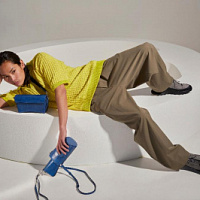
Effective methods that will help improve the effectiveness of sellers
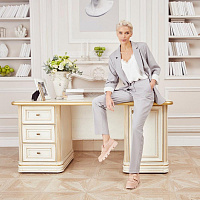
Service in the store: successes and mistakes

How to determine the amount of shoe purchases for the next season?
Popular
 Louis Vuitton opens a new factory in Italy
Louis Vuitton has opened its second shoe factory in Italy. After opening the first one in Fiesso d'Artico in Veneto, the LVMH flagship brand has just opened a new production site dedicated to this category of footwear in the industrial zone of Civitano in the Marche region. There is also another brand production facility in Tuscany, where bags and leather accessories are produced, writes fr.fashionnetwork.com.
Louis Vuitton opens a new factory in Italy
Louis Vuitton has opened its second shoe factory in Italy. After opening the first one in Fiesso d'Artico in Veneto, the LVMH flagship brand has just opened a new production site dedicated to this category of footwear in the industrial zone of Civitano in the Marche region. There is also another brand production facility in Tuscany, where bags and leather accessories are produced, writes fr.fashionnetwork.com.
 American buyers couldn't buy Birkin bags and sued Hermès
French fashion house Hermès is facing a lawsuit in California from two customers who were unable to purchase exclusive Birkin bags. The fashion house is accused of unfair commercial practices.
American buyers couldn't buy Birkin bags and sued Hermès
French fashion house Hermès is facing a lawsuit in California from two customers who were unable to purchase exclusive Birkin bags. The fashion house is accused of unfair commercial practices.
 We are ready for active development in the Russian market
Friedrich Naumann, CEO of the Tamaris brand, told Shoes Report about the company’s ambitious plans, business development in Russia and expansion of the retail network, and also shared details about new collections and launches.
We are ready for active development in the Russian market
Friedrich Naumann, CEO of the Tamaris brand, told Shoes Report about the company’s ambitious plans, business development in Russia and expansion of the retail network, and also shared details about new collections and launches.
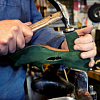 “Discount for repairs” of clothes and shoes in France supported workshops
The French have calculated the benefits of a program that encourages consumers to repair clothes and shoes by providing discounts on these services in certified workshops. The “repair discount” program began operating in France in November last year. Over the six months of operation of this program, the number of calls to repair shops in France increased 10 times and amounted to 250 repairs. The French saved 000 million euros, writes leparisien.fr.
“Discount for repairs” of clothes and shoes in France supported workshops
The French have calculated the benefits of a program that encourages consumers to repair clothes and shoes by providing discounts on these services in certified workshops. The “repair discount” program began operating in France in November last year. Over the six months of operation of this program, the number of calls to repair shops in France increased 10 times and amounted to 250 repairs. The French saved 000 million euros, writes leparisien.fr.
 Coach turned to Big Data analysis and won the interest of a young audience
American handbag brand Coach has planned the success of its Tabby model among a younger audience, Generation Z, by turning to big data analysis, abandoning traditional and analogue tools, such as human intuition or the ability of any executive to sense “which way the wind will blow,” writes B.O.F.
Coach turned to Big Data analysis and won the interest of a young audience
American handbag brand Coach has planned the success of its Tabby model among a younger audience, Generation Z, by turning to big data analysis, abandoning traditional and analogue tools, such as human intuition or the ability of any executive to sense “which way the wind will blow,” writes B.O.F.
 Why is it so important to work with customer reviews, analyze them and use them in your work?
Customer reviews are of great, invaluable importance when selling a product. However, many companies do not always understand this: they do not collect reviews, respond only to positive ones and do not work with negative ones. This is a big mistake and omission of the brand. In this article, together with SR digital marketing expert Tatyana Vasilyeva, we understand the intricacies and nuances of working with customer reviews and explain why it is worth paying attention to your customer reviews, and how this can increase your sales.
Why is it so important to work with customer reviews, analyze them and use them in your work?
Customer reviews are of great, invaluable importance when selling a product. However, many companies do not always understand this: they do not collect reviews, respond only to positive ones and do not work with negative ones. This is a big mistake and omission of the brand. In this article, together with SR digital marketing expert Tatyana Vasilyeva, we understand the intricacies and nuances of working with customer reviews and explain why it is worth paying attention to your customer reviews, and how this can increase your sales.
 The Euro Shoes@CAF exhibition will be held in Almaty
From March 11 to 13, the Euro Shoes@CAF (Central Asia Fashion) exhibition will be held in Almaty at the Atakent exhibition complex. The exhibition, which is the largest international event in the fashion industry in Central Asia, will present collections of clothing, shoes and accessories.
The Euro Shoes@CAF exhibition will be held in Almaty
From March 11 to 13, the Euro Shoes@CAF (Central Asia Fashion) exhibition will be held in Almaty at the Atakent exhibition complex. The exhibition, which is the largest international event in the fashion industry in Central Asia, will present collections of clothing, shoes and accessories.
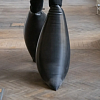 New “dutik” from Rick Owens presented at the show in Paris
Strange bulky shoes are another trend of our troubled times, and it’s impossible to ignore. American designer Rick Owens presented voluminous inflated latex boots at a show in Paris, which, according to him, were created in collaboration with the young London designer Straighteye, who likes to experiment with architectural volumes.
New “dutik” from Rick Owens presented at the show in Paris
Strange bulky shoes are another trend of our troubled times, and it’s impossible to ignore. American designer Rick Owens presented voluminous inflated latex boots at a show in Paris, which, according to him, were created in collaboration with the young London designer Straighteye, who likes to experiment with architectural volumes.
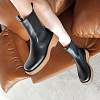 VAGA SHOES is a new participant in the Euro Shoes premiere collection
The Russian women's shoe factory VAGA SHOES will take part for the first time in the international exhibition of footwear and accessories Euro Shoes premiere collection in Moscow.
VAGA SHOES is a new participant in the Euro Shoes premiere collection
The Russian women's shoe factory VAGA SHOES will take part for the first time in the international exhibition of footwear and accessories Euro Shoes premiere collection in Moscow.
 Euro Shoes will start operating on February 19 in Moscow!
The winter session of the international exhibition of footwear and accessories Euro Shoes premiere collection will be held in Moscow at the Expocenter from February 19 to 22. The organizers promise the presence of all the main participants at the exhibition, as well as new names from Europe, Asia and Russia.
Euro Shoes will start operating on February 19 in Moscow!
The winter session of the international exhibition of footwear and accessories Euro Shoes premiere collection will be held in Moscow at the Expocenter from February 19 to 22. The organizers promise the presence of all the main participants at the exhibition, as well as new names from Europe, Asia and Russia.
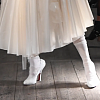 John Galliano and Christian Louboutin created the Tabi collection for Maison Margiela
Maison Margiela creative director John Galliano and French shoe designer Christian Louboutin released a shoe collaboration that was included in the Maison Margiela Artisanal spring 2024 couture collection. The design duo created six versions of the Tabi shoe. All shoe models in the collection have a split toe - a characteristic touch of the signature Tabi shoe model of the Maison Margiela brand. And Christian Louboutin gave the shoe its signature red sole.
John Galliano and Christian Louboutin created the Tabi collection for Maison Margiela
Maison Margiela creative director John Galliano and French shoe designer Christian Louboutin released a shoe collaboration that was included in the Maison Margiela Artisanal spring 2024 couture collection. The design duo created six versions of the Tabi shoe. All shoe models in the collection have a split toe - a characteristic touch of the signature Tabi shoe model of the Maison Margiela brand. And Christian Louboutin gave the shoe its signature red sole.
 Euro Shoes starts in a month in Moscow!
There is less than a month left before the main exhibition of shoes and accessories in Russia - Euro Shoes Premiere Collection. The event will take place from February 19 to 22 in Moscow at the Expocenter, and, as always, in partnership with the largest international clothing exhibition in Russia, CPM Premiere Moscow.
Euro Shoes starts in a month in Moscow!
There is less than a month left before the main exhibition of shoes and accessories in Russia - Euro Shoes Premiere Collection. The event will take place from February 19 to 22 in Moscow at the Expocenter, and, as always, in partnership with the largest international clothing exhibition in Russia, CPM Premiere Moscow.
 Christian Louboutin presented a collection in a cowboy style
At the Loubi Show in Paris, the French luxury brand Christian Louboutin presented its fall 2024 collection, following the trend - in the style of the Wild West. It included cowboy boots and rhinestone loafers.
Christian Louboutin presented a collection in a cowboy style
At the Loubi Show in Paris, the French luxury brand Christian Louboutin presented its fall 2024 collection, following the trend - in the style of the Wild West. It included cowboy boots and rhinestone loafers.
 Camper has released innovative sneakers - designers
Spanish brand Camper's new Roku sneaker features six interchangeable components to create up to 64 different looks and color combinations. Roku means "six" in Japanese.
Camper has released innovative sneakers - designers
Spanish brand Camper's new Roku sneaker features six interchangeable components to create up to 64 different looks and color combinations. Roku means "six" in Japanese.
 Why Rendez-Vous and Yandex Lavka released a “bread bag”
Shoe retailer Rendez-Vous announced the launch of a spring collaboration with Yandex Lavka and released a roll that resembles the shape of a woman’s handbag. This “Bread Bag” is presented in the Yandex.Lavka application at a price of 249 rubles. On the product packaging there is a promotional code for 1000 rubles, which can be spent in the Rendez-Vous network.
Why Rendez-Vous and Yandex Lavka released a “bread bag”
Shoe retailer Rendez-Vous announced the launch of a spring collaboration with Yandex Lavka and released a roll that resembles the shape of a woman’s handbag. This “Bread Bag” is presented in the Yandex.Lavka application at a price of 249 rubles. On the product packaging there is a promotional code for 1000 rubles, which can be spent in the Rendez-Vous network.
 Fashion Week takes place in Moscow
Fashion Week takes place in the Russian capital. Events include fashion shows, markets where you can purchase clothes, bags and accessories, and a B2B Showroom for fashion industry professionals.
Fashion Week takes place in Moscow
Fashion Week takes place in the Russian capital. Events include fashion shows, markets where you can purchase clothes, bags and accessories, and a B2B Showroom for fashion industry professionals.
 Fashion trends Fall-Winter 2023/24 for commercial footwear purchases
Permanent contributor to Shoes Report. Elena Vinogradova, an expert in sales and purchases in the fashion business, prepared an overview of the trends for the autumn-winter 2023/24 season especially for us.
Fashion trends Fall-Winter 2023/24 for commercial footwear purchases
Permanent contributor to Shoes Report. Elena Vinogradova, an expert in sales and purchases in the fashion business, prepared an overview of the trends for the autumn-winter 2023/24 season especially for us.
 MSCHF and Crocs launch "Big Yellow Boots"
Creator of the Big Red Boots, Brooklyn brand MSCHF has teamed up with American plastic clog and sandal brand Crocs for another oversized shoe. The new Big Yellow Boots will go on sale on August 9th.
MSCHF and Crocs launch "Big Yellow Boots"
Creator of the Big Red Boots, Brooklyn brand MSCHF has teamed up with American plastic clog and sandal brand Crocs for another oversized shoe. The new Big Yellow Boots will go on sale on August 9th.
 Five rules of professional lighting for a shoe store - something that is relevant in any season
When developing a lighting concept for shoe retailers, it is important to take into account not only the history of the brand, the architectural content of the premises, the target audience of the stores, but also the seasonality of the goods. With the onset of the cold season, client preferences change: bright weightless shoes are replaced by more massive models in discreet dark colors. Despite significant differences in summer and winter collections, the overall philosophy of the brand, its recognition should remain unchanged at any time of the year. Tatyana Ryzhova, an SR lighting expert in fashion retail, has identified five basic rules for a competent lighting concept for a shoe store for readers of the magazine, which will help to present winter assortment to customers in a winning way.
Five rules of professional lighting for a shoe store - something that is relevant in any season
When developing a lighting concept for shoe retailers, it is important to take into account not only the history of the brand, the architectural content of the premises, the target audience of the stores, but also the seasonality of the goods. With the onset of the cold season, client preferences change: bright weightless shoes are replaced by more massive models in discreet dark colors. Despite significant differences in summer and winter collections, the overall philosophy of the brand, its recognition should remain unchanged at any time of the year. Tatyana Ryzhova, an SR lighting expert in fashion retail, has identified five basic rules for a competent lighting concept for a shoe store for readers of the magazine, which will help to present winter assortment to customers in a winning way.
 Bertsy: what to look for when choosing a model
Bertsy and tactical boots are becoming more and more relevant footwear, and not only because of the start of the hunting season. In Russia, there are several dozen enterprises producing this type of footwear. Oleg Tereshin, Deputy Chief Technologist of ZENDEN, told Shoes Report about the differences and features of ankle boots and what you should pay attention to when buying them in specialized retail and online.
Bertsy: what to look for when choosing a model
Bertsy and tactical boots are becoming more and more relevant footwear, and not only because of the start of the hunting season. In Russia, there are several dozen enterprises producing this type of footwear. Oleg Tereshin, Deputy Chief Technologist of ZENDEN, told Shoes Report about the differences and features of ankle boots and what you should pay attention to when buying them in specialized retail and online.
 EURO SHOES presents an updated section of the GLOBAL SHOES exhibition with collections of shoe and bag brands from Asian countries
EURO SHOES premiere collection is expanding. Along with the traditional pool of leading European footwear brands from Germany, Spain, Italy and Turkey, several dozen footwear and bag brands from the Middle Kingdom will be presented in the GLOBAL SHOES section at the Moscow Expocentre from August 29 to September 1.
EURO SHOES presents an updated section of the GLOBAL SHOES exhibition with collections of shoe and bag brands from Asian countries
EURO SHOES premiere collection is expanding. Along with the traditional pool of leading European footwear brands from Germany, Spain, Italy and Turkey, several dozen footwear and bag brands from the Middle Kingdom will be presented in the GLOBAL SHOES section at the Moscow Expocentre from August 29 to September 1.
 I doubt and object: how to find an approach to difficult clients?
How good and serene would be the work of a salesperson if the customers were calm, cheerful, always knew exactly what they wanted, and bought, bought, bought! It is a pity that this is possible only in dreams. Therefore, we will not dream, but we will act. Together with Maria Gerasimenko, a permanent author of SR, we understand the doubts and objections of buyers and build a strategy for working with them. Our expert pays special attention to the two main objections of buyers, on which 82% of sales are lost.
I doubt and object: how to find an approach to difficult clients?
How good and serene would be the work of a salesperson if the customers were calm, cheerful, always knew exactly what they wanted, and bought, bought, bought! It is a pity that this is possible only in dreams. Therefore, we will not dream, but we will act. Together with Maria Gerasimenko, a permanent author of SR, we understand the doubts and objections of buyers and build a strategy for working with them. Our expert pays special attention to the two main objections of buyers, on which 82% of sales are lost.
 Two prominent Russian fashion designers Vyacheslav Zaitsev and Valentin Yudashkin passed away
One after another, two days apart, Vyacheslav Zaitsev and Valentin Yudashkin, outstanding fashion designers, whose work for the whole world was a kind of hallmark of fashionable Russia, left this world.
Two prominent Russian fashion designers Vyacheslav Zaitsev and Valentin Yudashkin passed away
One after another, two days apart, Vyacheslav Zaitsev and Valentin Yudashkin, outstanding fashion designers, whose work for the whole world was a kind of hallmark of fashionable Russia, left this world.
 World Footwear Yearbook: Global footwear production reaches 23,9 billion pairs and is back to pre-pandemic levels
The Portuguese association of shoe manufacturers APICCAPS published the 13th edition of the international statistical bulletin World Footwear Yearbook for 2023, according to which in 2022 the production and export of shoes worldwide increased by 7,6% and 9%, respectively, and the world production of shoes reached 23,9 billion couples and returned to pre-pandemic levels.
World Footwear Yearbook: Global footwear production reaches 23,9 billion pairs and is back to pre-pandemic levels
The Portuguese association of shoe manufacturers APICCAPS published the 13th edition of the international statistical bulletin World Footwear Yearbook for 2023, according to which in 2022 the production and export of shoes worldwide increased by 7,6% and 9%, respectively, and the world production of shoes reached 23,9 billion couples and returned to pre-pandemic levels.
 Rostov footwear brand Novak presented a collection of sneakers and sneakers
In the spring-summer 2023 season, the Rostov-on-Don shoe brand Novak presented a cute collection of sneakers and sneakers for every day. The upper of the shoe is made of genuine leather, suede, nubuck, the sole is made of light EVA.
Rostov footwear brand Novak presented a collection of sneakers and sneakers
In the spring-summer 2023 season, the Rostov-on-Don shoe brand Novak presented a cute collection of sneakers and sneakers for every day. The upper of the shoe is made of genuine leather, suede, nubuck, the sole is made of light EVA.
 How to create selling visual content for online based on the identified unique selling proposition?
What is a USP (unique selling proposition) and what is it for? Why is the USP creation service in great demand among fashion retailers today? How to create a working USP? Answers questions and provides step-by-step guidance on how to define your unique selling proposition and work with it to increase online sales, Tatyana Vasilyeva, an SR expert in the promotion and development of fashion brands.
How to create selling visual content for online based on the identified unique selling proposition?
What is a USP (unique selling proposition) and what is it for? Why is the USP creation service in great demand among fashion retailers today? How to create a working USP? Answers questions and provides step-by-step guidance on how to define your unique selling proposition and work with it to increase online sales, Tatyana Vasilyeva, an SR expert in the promotion and development of fashion brands.
 Shoe educational program: what shoe soles are made of
“What is the difference between TEP and EVA? What does tunit promise me? Is PVC glue? What is the sole of these shoes made of? ”- the modern buyer wants to know everything. In order not to smash his face in front of him and be able to explain whether such a sole suits him in soles, carefully read this article. In it, process engineer Igor Okorokov tells what materials the soles of shoes are made of and what makes each of them so good.
Shoe educational program: what shoe soles are made of
“What is the difference between TEP and EVA? What does tunit promise me? Is PVC glue? What is the sole of these shoes made of? ”- the modern buyer wants to know everything. In order not to smash his face in front of him and be able to explain whether such a sole suits him in soles, carefully read this article. In it, process engineer Igor Okorokov tells what materials the soles of shoes are made of and what makes each of them so good.
 How to set prices that will earn
Some businessmen still confuse the concept of margin with the concept of trade margins and set prices for their goods, guided solely by the example of competitors. No wonder they go broke! Analyst at the Academy of Retail Technologies Maxim Gorshkov gives several tips and formulas with which you can set not only ruinous, but also profitable prices.
How to set prices that will earn
Some businessmen still confuse the concept of margin with the concept of trade margins and set prices for their goods, guided solely by the example of competitors. No wonder they go broke! Analyst at the Academy of Retail Technologies Maxim Gorshkov gives several tips and formulas with which you can set not only ruinous, but also profitable prices.
 Sales of shoes and accessories: effective techniques for business rhetoric
Which speech modules are effective in communicating with potential and current customers of shoe stores, and which are not, Anna Bocharova, a business consultant, knows.
Sales of shoes and accessories: effective techniques for business rhetoric
Which speech modules are effective in communicating with potential and current customers of shoe stores, and which are not, Anna Bocharova, a business consultant, knows.
 We form the salary of sellers: expert advice
“How do you charge your consultants for personal or general sales?” Is one of the most popular questions causing a lot of controversy and gossip on the online forums of retail business owners. Indeed, how to properly form the earnings of sellers? But what about bonuses, where to get a sales plan from, do employees allow them to buy goods at discounted stores? In search of truth, the Shoes Report turned to a dozen shoe retailers, but no company wanted to disclose its motivation system - the process of its development was too complicated and individual. Then we asked four business consultants, and finally became convinced that the topic of seller motivation is very complex, because even our experts could not come to a common opinion.
We form the salary of sellers: expert advice
“How do you charge your consultants for personal or general sales?” Is one of the most popular questions causing a lot of controversy and gossip on the online forums of retail business owners. Indeed, how to properly form the earnings of sellers? But what about bonuses, where to get a sales plan from, do employees allow them to buy goods at discounted stores? In search of truth, the Shoes Report turned to a dozen shoe retailers, but no company wanted to disclose its motivation system - the process of its development was too complicated and individual. Then we asked four business consultants, and finally became convinced that the topic of seller motivation is very complex, because even our experts could not come to a common opinion.
 The whole truth about Bayer. Who is he and how to become one?
Bayer is no longer a new, but still a popular and sought-after profession. It’s fashionable to be a buyer. Buyers are at the origins of the emergence and development of trends. If the designer offers his vision of fashion in the season, then the buyer selects the most interesting commercial ideas. It is on buyers that the policy of sales of stores and what, in the end, the buyer will wear depends on. This profession is surrounded by a magical fleur, often associated with a lack of understanding of what exactly is the work of a buyer.
The whole truth about Bayer. Who is he and how to become one?
Bayer is no longer a new, but still a popular and sought-after profession. It’s fashionable to be a buyer. Buyers are at the origins of the emergence and development of trends. If the designer offers his vision of fashion in the season, then the buyer selects the most interesting commercial ideas. It is on buyers that the policy of sales of stores and what, in the end, the buyer will wear depends on. This profession is surrounded by a magical fleur, often associated with a lack of understanding of what exactly is the work of a buyer.
 Technology Selling Issues
There is nothing worse than meeting the buyer with the words “Hello, can I help you with something?”, Because the seller works in the store just to help. Criticizing this well-established pattern of communication with the buyer, Andrei Chirkarev, business coach for effective sales and the founder of the New Economy project, shares the technology of truly selling issues with readers of Shoes Report.
Technology Selling Issues
There is nothing worse than meeting the buyer with the words “Hello, can I help you with something?”, Because the seller works in the store just to help. Criticizing this well-established pattern of communication with the buyer, Andrei Chirkarev, business coach for effective sales and the founder of the New Economy project, shares the technology of truly selling issues with readers of Shoes Report.
 Fur, and not only: types of lining
In the production of winter footwear, various materials are used that are designed to retain heat and meet the requirements of consumers: natural sheepleather, artificial fur, artificial fur from natural wool and others. All types of lining fur have their own advantages and disadvantages. Let's consider the properties of each of them.
Fur, and not only: types of lining
In the production of winter footwear, various materials are used that are designed to retain heat and meet the requirements of consumers: natural sheepleather, artificial fur, artificial fur from natural wool and others. All types of lining fur have their own advantages and disadvantages. Let's consider the properties of each of them.
 Retail Arithmetic
Before you begin to solve specific problems, you need to find out how accurately all the leaders of your company understand the basic terminology of retail.
Retail Arithmetic
Before you begin to solve specific problems, you need to find out how accurately all the leaders of your company understand the basic terminology of retail.
 How to fire a worker without tears, scandal and trial
Sooner or later, any manager is faced with the need to part with an employee. Properly and on time the dismissal procedure will save the company money, and the boss himself - nerves and time. But why sometimes, knowing that a break in relations is inevitable, we put off the decision for months?
How to fire a worker without tears, scandal and trial
Sooner or later, any manager is faced with the need to part with an employee. Properly and on time the dismissal procedure will save the company money, and the boss himself - nerves and time. But why sometimes, knowing that a break in relations is inevitable, we put off the decision for months?






